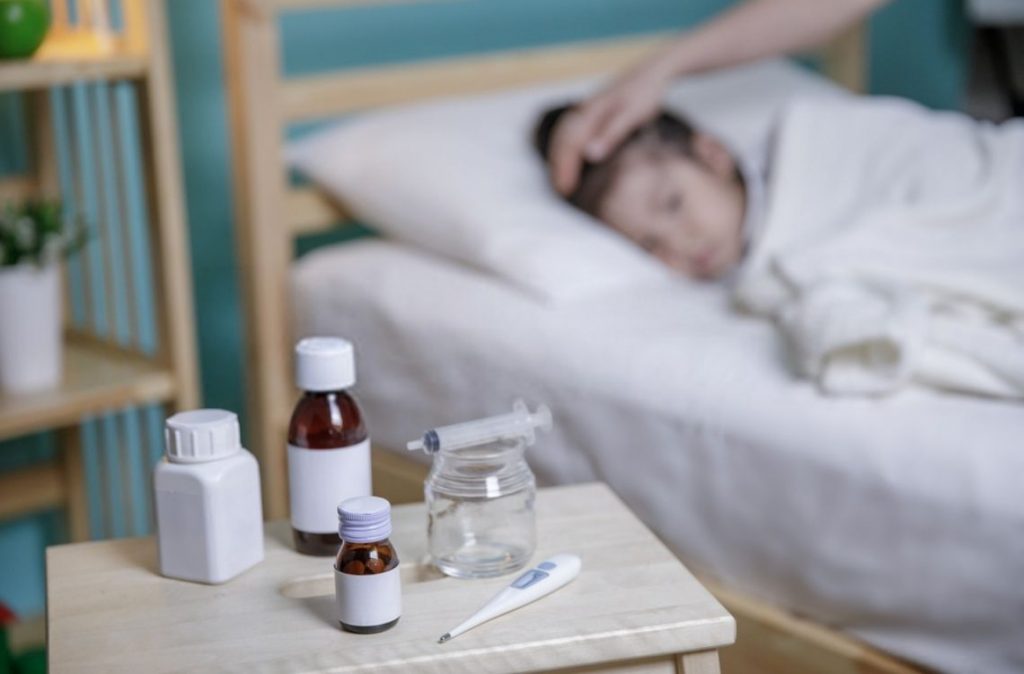When our child gets sick, we tend to be the hero and ‘take over’ the doctor’s occupation. As a parent, we try to protect our children by giving them unprescribed medicine to our children without consulting a doctor.
Do you know that it is dangerous to your child’s health?
One day, I was talking to a friend of mine whose daughter had a high fever. However, at that time she refused to bring her child to see a doctor. So, she ended up giving her child an excessive amount of Panadol which her child didn’t need!
Even worse, she gave her child coconut water as a way to lower the fever down. Of course, that didn’t work. Later on, her child’s health got worse and when she went to the clinic, the doctor had to admit her daughter in the hospital for having dengue!
Isn’t that harmful? Yes, it is! According to research, every eight minutes, a well-meaning parent or caregiver accidentally commits a medication mistake, affecting a child.
Children under the age of 6 have experienced drug failures in non-hospital locations.
Although parents and caregivers are going to do whatever it takes to make a sick child feel better, research reveals that unintentionally, a shocking number makes matters worse.
Unfortunately, some children had passed away because of medication errors.
How Can It Happen?
This may happen in a child’s home, in another household, or at school or daycare. Instances, where such mistakes can occur, include caregivers giving one child twice the same medicine, misquoting dosing instructions, or prescribing the wrong medication.
4 Common Mistakes Of Medication By Parents That Is Actually Harmful!
1) Cough Syrup
Cough syrup intake for children under 2 years old has been reported with seizures, accelerated heart rates, reduced consciousness levels, and death.
You should NEVER give your children a cough syrup without a doctor’s prescription. This is because it contains decongestant or antihistamine which can be damaging for your child.
Here are some safe alternatives from doctor’s advice that I used for my child, for coughing:
- Cool air humidifier
- Drinking extra fluids
- Rest and decreased activity, especially avoiding physical activity that may make a cough worse
- Saline nasal drops, with bulb suctioning for newborns and infants
2) Usage of ‘Over the Counter’ Medicines
Many parents choose ‘over the counter’ medicines because it is accessible at any store and this happens when the parents are too busy to bring their children to see a doctor.
My dear parents out there – this has to change. ‘Over the counter’ medicines are mostly made for adults and it is proven that it is not safe for children.
Decongestants, expectorants, antihistamines, and cough suppressants can seriously threaten your child’s life! Always refer to your doctor for the most suitable medicines for your child.
3) Measurement of Dose
Overdose or underdose? Some parents didn’t use the right measurement tools as told by the doctor.
For example, some medicines have measurement cups or a syringe to be taken with, but parents tend to follow their own measurement using a spoon to replace those tools.
This is wrongly done because it can cause overdose or underdose which will affect your children’s health!
Like the story I have shared, my friend had given an excessive amount of medicine for her daughter. This made her health even worse than before.
So, make sure you are aware of what measurement to use such as ‘millilitres’, ‘tablespoon’ and ‘teaspoon’.
4) Mixing up Medicine
The risk of mixing drugs is that they can interact in ways that increase side effects that are undesirable or harmful.
Let’s say one drug that induces mild sedation is administered to your child and a second one does the same thing.
The consequence could be so much sedation that the child cannot bear himself and does not remain awake!
A tip that I can share from my experience as a Mum is to NOT have two doctors recommending medicines for your children at the same time. This will allow you to not get confused and mix up on which medicines to use.
Besides That, What Can You Do?
But, what if medication errors happened not because of your fault? Trust me, there is plenty of news about other people such as relatives or caretaker who take care of the children without knowing which medicine to give.
As a parent, you can help to avoid this incident by communicating and properly explain about the medicines and its purposes to the caretaker.
You can start by reminding them what time of the day your children need to take the medicine and the amount that they have to consume.
This is very important because it might worsen your children’s health if they are given at the wrong time and dosage.
Keep in mind that it is very important to educate the caretakers too because they are responsible for your children’s well being while you are away. It will make you feel better too.
Hopefully, this would give awareness to my fellow parents on how important medicines work for your children. Negligence can happen when you are too busy to take care of your loved ones.
Remember to read the labels and instructions of the medicines before giving them to your child. Their health is your responsibility and that is a privilege that you should NEVER take for granted.
